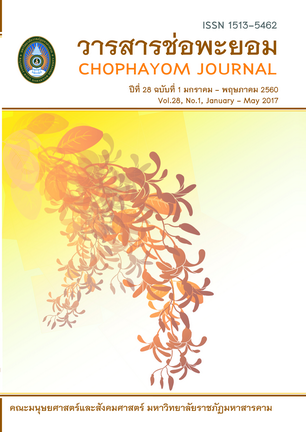ภูมิปัญญาท้องถิ่นกับการจัดการสิ่งแวดล้อมในชุมชน : กรณีศึกษาชุมชนบ้านหนองโก อำเภอโกสุมพิสัย จังหวัดมหาสารคาม A Management of Environmental with Local Wisdoms : The Case study Ban Nonggoa Kosumphisal District, Mahasarakham Province
Abstract
บทคัดย่อ
การวิจัยครั้งนี้มีวัตถุประสงค์เพื่อศึกษาเพื่อศึกษาภูมิปัญญาท้องถิ่นกับการจัดการสิ่งแวดล้อมในชุมชนบ้านหนองโก ตำบลแพง อำเภอโกสุมพิสัย จังหวัดมหาสารคาม โดยผู้วิจัยได้แบ่งการวิจัยออกเป็น 2 ระยะ ได้แก่ ระยะที่ 1 ศึกษาบริบทของชุมชนบ้านหนองโก ซึ่งกลุ่มเป้าหมายที่ทำการศึกษา ได้แก่ ผู้ใหญ่บ้าน ผู้อาวุโสหรือผู้มีความรู้ และเจ้าอาวาสวัดอัมพวนาราม (บ้านหนองโก) จำนวน 9 คน ระยะที่ 2 ศึกษาภูมิปัญญาท้องถิ่นกับการจัดการสิ่งแวดล้อมในชุมชนบ้านหนองโก ได้แก่ ผู้ใหญ่บ้าน ผู้อาวุโสหรือผู้มีความรู้ และเจ้าอาวาสวัดอัมพวนาราม (บ้านหนองโก) จำนวน 7 คน เครื่องมือที่ใช้ในการวิจัยทั้ง 2 ระยะ ได้แก่ แบบสัมภาษณ์ชนิดมีโครงสร้าง แบบสัมภาษณ์ชนิดไม่มีโครงสร้าง แบบสังเกตชนิดมีส่วนร่วม และแบบสังเกตชนิดไม่มีส่วนร่วม นำข้อมูลที่ได้จากทั้ง 2 ระยะมาวิเคราะห์และสังเคราะห์โดยการเขียนรายงานเชิงพรรณนา ผลการวิจัยพบว่า 1. บริบทของชุมชนบ้านหนองโก ตำบลแพง อำเภอโกสุมพิสัย จังหวัดมหาสารคาม เริ่มจัดตั้งหมู่บ้าน ประมาณปี พ.ศ. 2369 ในปัจจุบันแบ่งการปกครองออกเป็น 3 หมู่บ้าน ได้แก่ บ้านหนองโก หมู่ที่ 6, บ้านหนองโก หมู่ที่ 10 และบ้านหนองโก หมู่ที่ 16 ซึ่งลักษณะทางกายภาพของชุมชนบ้านหนองโกเป็นที่ราบสูง พื้นที่มีลักษณะดินปนทราย มีป่าไม้โดยทั่วไปเป็นป่าโปร่ง ลักษณะภูมิอากาศ เป็นแบบมรสุม มี 3 ฤดู ฤดูร้อนอากาศร้อนจัดมาก (เดือนมีนาคม - พฤษภาคม) ฤดูฝนจะมีฝนตกชุกเป็นบางช่วงและไม่ตกตามฤดูกาลเกษตรมักไม่ได้ทำการเกษตรตรงตามฤดูกาล ฤดูหนาวอากาศค่อนข้างหนาวมากและแห้งแล้ง 2. จากการศึกษาภูมิปัญญาท้องถิ่นกับการจัดการสิ่งแวดล้อมในชุมชน มีรายละเอียดดังนี้ 2.1 ภูมิปัญญาท้องถิ่นในการอนุรักษ์ดิน พบว่า ชุมชนบ้านหนองโก ได้ดัดแปลงภูมิปัญญาท้องถิ่นเพื่อให้สอดคล้องตามลักษณะพื้นที่ของหมู่บ้าน โดยแหล่งที่มาของภูมิปัญญามี 3 แหล่งด้วยกัน คือ การถ่ายทอดจากบรรพบุรุษ ประสบการณ์ของตนเองและการส่งเสริมและฝึกอบรมจากเจ้าหน้าที่ของรัฐ 2.2 ภูมิปัญญาท้องถิ่นในการอนุรักษ์นํ้า พบว่า ชุมชนบ้านหนองโก ได้นำภูมิปัญญาท้องถิ่นมาใช้ในการอนุรักษ์นํ้ายังมีอยู่ซึ่งเป็นการผสมผสานกับเทคโนโลยีท้องถิ่น เทคโนโลยีสมัยใหม่ เพื่อการอนุรักษ์และการจัดการนํ้าจากแหล่งนํ้าและนํ้าฝนมาใช้บริโภคอุปโภคและการประกอบอาชีพภาคเกษตรกรรม อุตสาหกรรม ธุรกิจครัวเรือน 2.3 ภูมิปัญญาท้องถิ่นในการอนุรักษ์ป่า พบว่า ชุมชนบ้านหนองโกทั้ง 3 ชุมชนได้ใช้ภูมิปัญญาท้องถิ่นในการอนุรักษป์ า่ ชุมชนใน 2 กรณี คือ การใชภู้มิปญั ญาทอ้ งถิ่นผา่ นพิธีกรรม และการใชภู้มิปญั ญาทอ้ งถิ่นในชีวิตประจำวัน 2.4 ภูมิปัญญาท้องถิ่นด้านการเกษตร พบว่า ชุมชนบ้านหนองโกยึดอาชีพเกษตรกรรมเป็นหลัก และไม่มีความคิดที่จะเลิกและละทิ้งงานอาชีพเกษตรกรรม เพราะเป็นอาชีพที่ชาวบ้านคุ้นเคยมาตั้งแต่เล็ก ทำให้ชาวบ้านเกิดความผูกพันกับอาชีพเกษตรกรรม ซึ่งภูมิปัญญาท้องถิ่นด้านการเกษตรของชุมชนบ้านหนองโกที่สำคัญ คือ การทำนาข้าว การทำสวน การปลูกพืชผักสวนครัวปลอดสารพิษ การเลี้ยงสัตว์ และการแปรรูปผลิตทางการเกษตร 2.5 ภูมิปัญญาด้านหัตถกรรม พบว่า ชุมชนบ้านหนองโก มีความรู้ความชำนาญในการจักสานสามารถจักสานเครื่องมือเครื่องใช้ โดยเลือกใช้พืชที่มีอยู่ตามธรรมชาติในหมู่บ้านเพื่อให้มีคุณภาพ และสามารถใช้งานได้ยาวนาน ได้แก่ หัตถกรรมเครื่องจักรสานที่ใช้เป็นภาชนะใช้สอยต่าง ๆ หัตถกรรมเครื่องจักสานที่ใช้เพื่อการชั่ง ตวง วัด หัตถกรรมเครื่องจักสานที่ใช้สำหรับบรรจุสิ่งของ หัตถกรรมเครื่องจักสานที่ใช้สำหรับดักจับสัตว์นํ้า หัตถกรรมเครื่องจักสานสำหรับการใช้สอยทั่วไปในครัวเรือน หัตถกรรมเครื่องจักสานสำหรับใช้ประกอบเป็นเครื่องเรือน หัตถกรรมเครื่องจักสานที่ทำเป็นชิ้นงานสำหรับการใช้เฉพาะอย่าง (ไม่ได้ทำจากไม้ไผ่หรือไม้ไผ่เป็นเพียงวัสดุประกอบ) และหัตถกรรมเครื่องจักสานในลักษณะการใช้งานอื่น ๆ 2.6 ภูมิปัญญาด้านประเพณีท้องถิ่น พบว่า ชุมชนบ้านหนองโก มีประเพณี พิธีกรรม ความเชื่อ ที่เชื่อมโยงระหว่างความคิดกับพฤติกรรม นามธรรมสู่รูปธรรมกับโลกและชีวิต บนพื้นฐานความสัมพันธ์ระหว่างมนุษย์กับมนุษย์ มนุษย์กับธรรมชาติ และมนุษย์กับสิ่งศักดิ์สิทธิ์ ซึ่งพิธีกรรมที่เกี่ยวกับระบบการผลิต ความเชื่อเกี่ยวกับความอุดมสมบูรณ์และการพึ่งพาใช้ประโยชน์จากทรัพยากรของชาวบ้าน ยังมีความเชื่อเรื่องผี ทั้งนี้อาจเป็นเพราะว่าความเชื่อเกี่ยวกับผีนั้นสามารถตอบสนองความต้องการของคนได้รวดเร็วกว่าคำสอนในทางพุทธศาสนา แต่มิได้หมายความว่าพุทธศาสนาตอบสนองความต้องการของชุมชนไม่ได้ คำสำคัญ : ภูมิปัญญาท้องถิ่น, การจัดการสิ่งแวดล้อม, ชุมชนบ้านหนองโก
ABSTARCT
This research aims to study of local wisdom for environmental management in community
of Ban Nonggoa, Ban Pang Sub - district, Kosumphisal District, Mahasarakham Province.
The researchers divided the study Into two phases : Phase 1 study to context of Ban Nonggoa, which the target group was headman, older or knowledge, and abbot of Amphawanaram temple (Ban Nonggoa) for all figure 9 people. Phase 2 it was study to local knowledge of environment management in Ban Nonggoa as headman, older or knowledge, and abbot of Amphawanaram temple (Ban Nonggoa) for all figure 7 people. The research was used to tool in all include ; structure interview questionnaire, non - structure interview questionnaire, observe of participation, and non - observe of participation. The data from both was analyze and synthetic by writing descriptive. All the result as: 1. Context of Ban Nonggoa, Ban Pang sub-district, Kosumphisai district, Mahasarakham Province. The present administration disport was 3 villages include; Ban Nonggoa 6, Ban Nonggoa 10, and Ban Nonggoa 16 respectively. Which the physical of Ban Nonggoa was plateau, the area of sandy soil, sparse forest, the weather have been 3 season as summer (March to May), the rainy season will be some rain, and none rainy season. The farmers often don’t produce to the agricultural season. In the winter was rather cold and dry. 2. The study of local wisdom about management of village to details was as follows : 2.1 The local wisdom in conservation of soil to Ban Nonggoa was modified of local wisdom to accord by nature of village. The local wisdom sources have 3 along as transmitted from predecessor, experience of mind, and promotion and training of government officials. 2.2 The local wisdom in conservation of water to Ban Nonggoa was used to remain conservation of water. It was blend of local technology, and modern technology to conservation and management source of water, consume of life, and occupations for agriculture, industry, and household business. 2.3 The local wisdom in conservation of forest to all of Ban Nonggoa was used local wisdom in 2 cases include; used of local wisdom through the rites, and used local wisdom in daily of life. 2.4 The local wisdom in conservation of agricultural to Ban Nonggoa was depend to career of agricultural and none idea to quit and leave. It was a career that since childhood and commitment to several of agricultural. The local wisdom of agricultural to Ban Nonggoa was planting of paddy rice, gardening, organic vegetable, animals, and processing of agricultural production. 2.5 The local wisdom of manufacture to Ban Nonggoa was expertise in basketry and tools used by plants that was naturally in the village to provide quality of product and usable life include; wicker use a container of living, weights and measures, packing materials, fishing, living in a household, furniture, specific wicker (don’t of bamboo or composite materials), and other usage. 2.6 The local wisdom of tradition to Ban Nonggoa has festival, rite, and believe to link between thought and abstract behavior to substantial of global and life. It was on the basis of the relationship between human with human, human with nature, and human with holy thing. The rite was about to produce, believed of the abundance and dependence on exploitation of the locals. Keywords : Local Wisdoms, Management of Environmental, Ban Nonggoa






